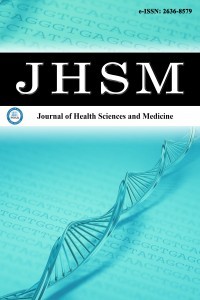Evaluation and epigenetic impact of B12, vitamin D, folic acid and anemia in Hashimato's thyroiditis
Hashimoto, otoimmun disease, Vitamin D (vit-D), anti-TPO, Ferritin, Vitamin B12
Evaluation and epigenetic impact of B12, vitamin D, folic acid and anemia in Hashimoto's thyroiditis: a clinical and molecular docking study
Hashimoto, otoimmun disease, vitamin D, anti-TPO, ferritin, vitamin B12,
___
- Ragusa F, Fallahi P, Elia G, et al. Hashimotos’ thyroiditis: epidemiology, pathogenesis, clinic and therapy. Best Practice Res Clin Endocrinol Metab. 2019;33(6):101367.
- McLeod DS, Caturegli P, Cooper DS, et al. Variation in rates of autoim- mune thyroid disease by race/ethnicity in US military personnel. JAMA. 2014;311(15):1563–1565.
- Rayman MP. Multiple nutritional factors and thyroid disease, with particular reference to autoimmune thyroid disease. Proc Nutr Soc. 2019;78(1):34-44.
- Kawicka A, Regulska-Ilow B. Metabolic disorders and nutritional status in autoimmune thyroid diseases. Advances in Hygiene & Experimental Medicine/Postepy Higieny i Medycyny Doswiadczalnej. 2015;69:80-90.
- Öztekin, Y, Ayaz A. Otoimmün tiroid hastalıklarında D vitamininin Rolü. İzmir Katip Çelebi Üniversitesi Sağlık Bilimleri Fakültesi Derg. 2015;7(1):179-184.
- Wiersinga WM. Clinical relevance of envi- ronmental factors in the pathogenesis of au- toimmune thyroid disease. Endocrinol Metab. 2016;31(2):213-222.
- Zaletel K, Gaberscek S. Hashimoto's thyroiditis:from genes to the disease. Curr Genomics. 2011;12(8):576-588.
- Aktaş HŞ. Vitamin B12 and Vitamin D levels in patients with autoimmune hypothyroidism and their correlation with anti-thyroid peroxidase antibodies. Med Princ Pract. 2020;29(4);364-370.
- Elvira D. The Role of T-Regulatory Expression in Autoimmune Thyroid Disease and its association with Thyroid antibody. J Autoim Disor. 2016;2;2:19.
- Krysia R, Szkróbka W, Okopień B. The effect of vitamin D on thyroid autoimmunity in levothyroxine-treated women with Hashimoto’s thyroiditis and normal vitamin D status. Exp Clin Endocrinol Diabetes. 2017;125(4):229-233.
- Hu S, Rayman MP. Multiple nutritional factors and the risk of Hashimoto's thyroiditis. Thyroid. 2017;27(5):597-610.
- Ashraf TS, De Sanctis V, Yassin M, Wagdy M, & Soliman N. Chronic anemia and thyroid function. Acta Bio Medica: Atenei Parmensis. 2017;88(1):119.
- Koç Ş, Güngör K, Güngör ND, Uzunlulu M. Iron deficiency in women with thyroid-specific autoantibodies:a case control study. J Exp Clin Med. 2022;39(1):194-198.
- Das P, Dasnayak G, Senapati U. Cytomorphological spectrum of Hashimoto's thyroiditis and its correlatıon with clinical presentation, thyroid function test and antibody level. Int J Sci Res. 2018;7:2277-2282.
- Rosen Y, Daich J, Soliman I, Brathwaite E, Shoenfeld Y. Vitamin D and autoimmunity. Scand J Rheumatol. 2016;45(6):439–447.
- Kivity S, Agmon-Levin N, Zisappl M, et al. Vitamin D and autoimmune thyroid diseases. Cell Mol Immunol. 2011;8(3):243–247.
- Unal AD, Tarcin O, Parildar H, et al. Vitamin D deficiency is related to thyroid antibodies in autoimmune thyroiditis. Cent Eur J Immunol. 2014;39(4):493–497.
- Kim D. The role of vitamin D in thyroid diseases. Int J Mol Sci. 2017;18(9):1949.
- Mele C, Caputo M, Bisceglia A, et al. Immunomodulatory effects of vitamin D in thyroid diseases. Nutrients. 2020;12(5):1444.
- Rubens M, Ramamoorthy V, Saxena P, et al. Association between vitamin D deficiency and hypothyroidism:results from the National Health and Nutrition Examination Survey (NHANES). 2007–2012. BMC Endocr Disord. 2021;21(1):1-9.
- Ece A, Sevin F. Exploring QSAR on 4-cyclohexylmethoxypyrimidines as antitumor agents for their inhibitory activity of cdk2. Letters in Drug Design & Discovery. 2010;7:625-631.
- Chan K, Frankish N, Zhang T, et al. Bioactive indanes:insight into the bioactivity of indane dimers related to the lead anti-inflammatory molecule PH46A. J Pharm Pharmacol. 2020;72(7):927-937.
- Yamali C, Gul HI, Sakarya M.T, et al. Quinazolinone-based benzenesulfonamides with low toxicity and high affinity as monoamine oxidase-A inhibitors:synthesis, biological evaluation and induced-fit docking studies. Bioor Chem. 2022;124:105822.
- Luo X, Zheng T, Mao C, et al. Aberrant MRP14 expression in thyroid follicular cells mediates chemokine secretion through the IL-1β/MAPK pathway in Hashimoto’s thyroiditis. Endocr Connect. 2018;7(6):850-858.
- Gan XX, Zhong LK, Shen F, et al. Network pharmacology to explore the molecular mechanisms of prunella vulgaris for treating Hashimoto’s thyroiditis. Front Pharmacol. 2021:12.
- Beyazit Y, Kocak E, Tanoglu A, Kekilli M. Oxidative stress might play a role in low serum vitamin D associated liver fibrosis among patients with autoimmune hepatitis. Dig Dis Sci. 2015;60(4):1106-1108.
- Yayın Aralığı: Yılda 6 Sayı
- Başlangıç: 2018
- Yayıncı: MediHealth Academy Yayıncılık
Evaluation and epigenetic impact of B12, vitamin D, folic acid and anemia in Hashimato's thyroiditis
Elif DEMİRCİ SAADET, Halil Gürdal İNAL, Bedreddin SEÇKİN, Süleyman AKARSU
Retrospective investigation of acute kidney injury in postoperative patients in ICU
The use of fetal bovine acellular dermal matrix for management of chronic wounds
Betül ÖZTÜRK, Sadettin Burak AÇIKEL, Ali GÜNGÖR, Muhammed Mustafa GÜNEYLİOĞLU, Raziye Merve YARADILMIŞ, İlknur BODUR, Aysun TEKELİ, Ayla AKCA ÇAĞLAR, Aytaç GÖKTUĞ, Nilden TUYGUN, Can Demir KARACAN
Merve YENİÇERİ ÖZATA, Seda FALAKALOĞLU, Mehmet ESKİBAĞLAR
